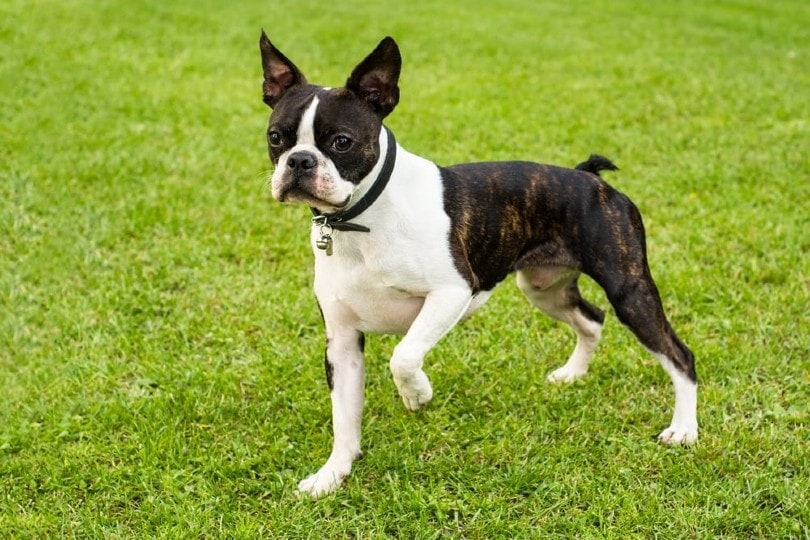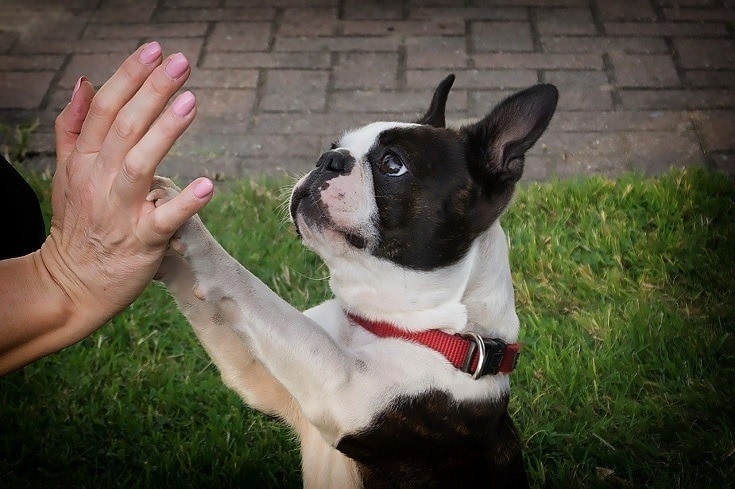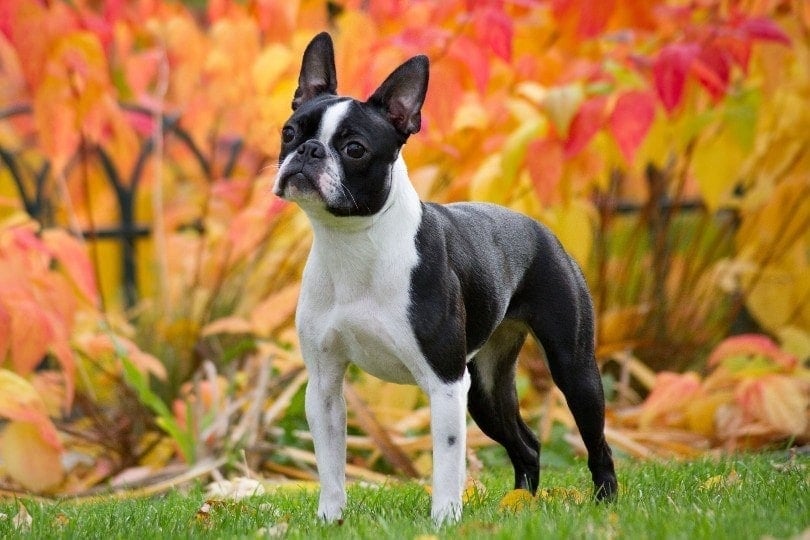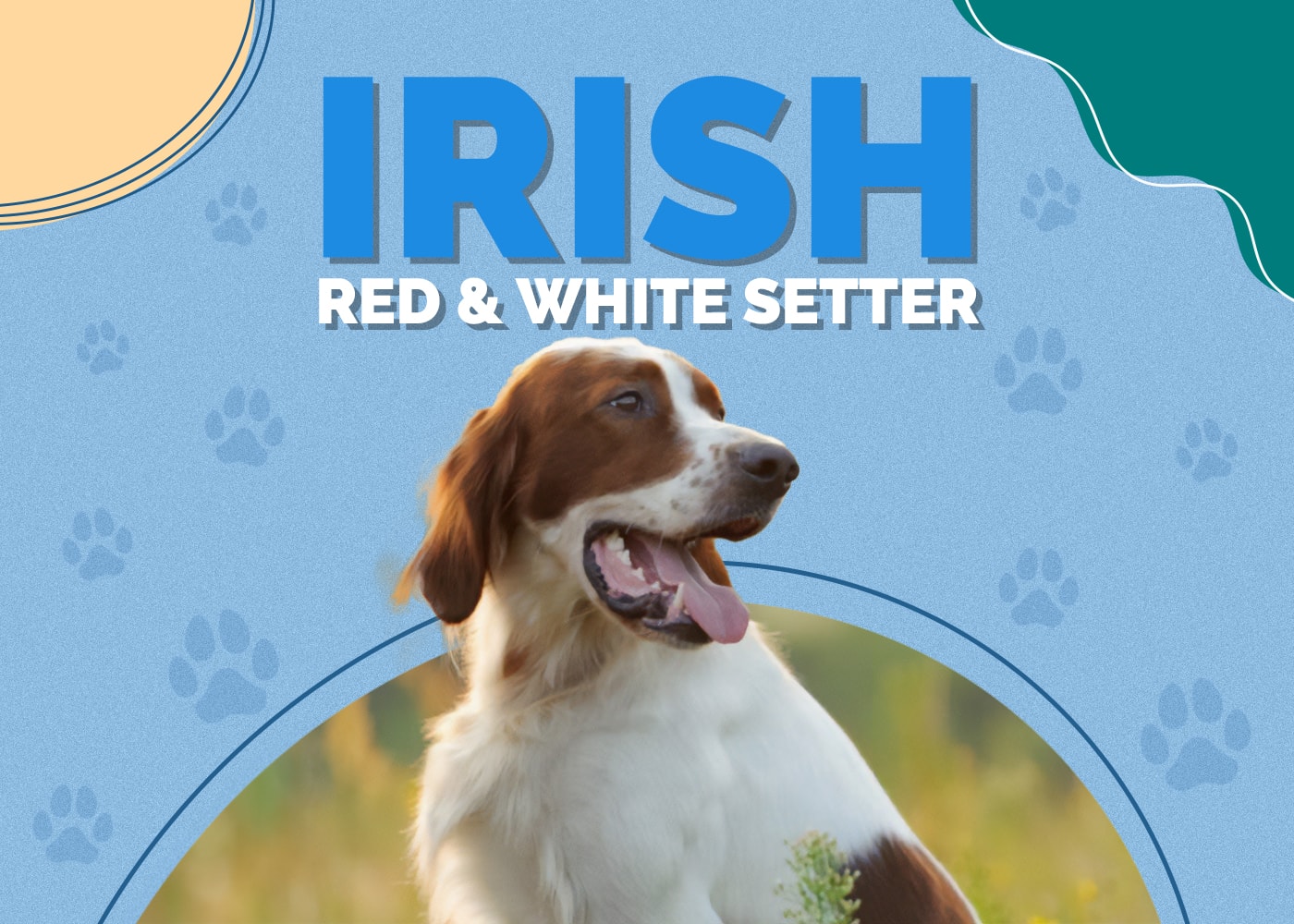Boston Terrier Dog Breed Info: Pictures, Traits & Facts

Updated on

| Height: | 9–15 inches |
| Weight: | 5–25 pounds |
| Lifespan: | 13–15 years |
| Colors: | Black, brindle, isabella, fawn |
| Suitable for: | Active families, those looking for a low-shedding dog |
| Temperament: | Loyal, loving, intelligent, easy to train, friendly, gets along with other pets |
There are few dogs as blissfully unaware of their limitations as the Boston Terrier. They’re small dogs but think that they’re big, they’re fragile pups but think that they’re invincible, and they’re out-of-shape pooches but think that they’re marathoners. Basically, these dogs have huge personalities.
If you want to learn more about these charismatic dogs, the guide below has everything you need to know to get up to speed quickly.
Boston Terrier Puppies

Boston Terrier puppies can vary wildly in terms of personality. Some are goofy and playful, some are serious and stern, but they all have one thing in common: a set-in-stone belief that they are the most important and powerful beings in the universe. That’s especially adorable given how tiny these puppies are. Fully-grown Bostons are small dogs, so you can imagine how diminutive they are as puppies. It just adds to their charm.
They’re energetic as young pups and always in motion. They’re constantly either destroying things or thinking about destroying things, so you’ll need to keep your shoes and other valuables off the floor. They tend to be fearless as well, which doesn’t bode well for their longevity. They’ll happily plunge headlong off your lap or issue a challenge to a much larger dog. Half of your job when raising one of these puppies will be to keep them from hurting themselves.
All that effort will be well worth it, however. These puppies are endless amounts of fun, and they’ll worm their way into your heart from the first moment you lay eyes on them.
3 Little-Known Facts About the Boston Terrier
1. They’re All-American Dogs
Boston Terriers were the first dog breed to be created in the United. In fact, their nickname is the “American Gentleman,” due to their friendly disposition and tuxedo-like coat.
There have been a few other officially recognized breeds that have since been developed stateside, but the first will always be the Boston Terrier.
2. A Boston Terrier Was the First Dog Ever to Earn an Army Rank
During World War I, a Boston Terrier named Stubby was found as a stray near Yale University by members of the 102nd Infantry. The troops then smuggled Stubby onto a transport overseas. He accompanied his new masters into battle and was soon injured by mustard gas. The troops outfitted him with a gas mask, and now that Stubby knew what to be on the lookout for, he was able to warn other soldiers about poison attacks.
Stubby also helped the war effort by locating wounded soldiers, alerting troops of incoming artillery fire, and even capturing a German spy.
At the end of the war, Stubby was awarded the rank of Sergeant, making him the first dog ever to be so honored by the U.S. military. There was even an animated movie made about his life in 2018.
3. They Often Have to Be Born Via C-Section
Boston Terriers have large heads relative to their bodies, which often makes normal birth impossible. Instead, they have to be born via Cesarean section.
This is just one of many health issues that the breed often suffers from, due to breeding for selective qualities. Since many people appreciate certain features about the dogs, like their big heads or bulging eyes, breeders attempt to accentuate those features.
That’s great for making adorable pups, but it’s not ideal for the long-term health of the breed.

A Brief History of the Boston Terrier
In 1875, a Bostonian named Robert C. Hooper bought a Bull and Terrier dog named Judge. Judge is considered the ancestor of all true Boston Terriers, and he was bred with a Bulldog female named Gyp. Their subsequent puppies proved popular with other breeders in New England, and they continued to refine the breed.
Early Boston Terriers were much larger than their modern counterparts. They were originally bred for hunting rodents and pit fighting; however, as those bloody pastimes fell out of favor, breeders began to make Bostons smaller and less muscular.
The American Kennel Club recognized the breed in 1891, making it the first official breed created in the United States. To that point, the breed had been known as the Round-Headed Bull and Terrier, but to honor the city of their birth, they were then renamed the Boston Terrier.
For the first 40 years or so of the 20th century, the Boston Terrier was the most popular dog breed in the United States. Their popularity has flagged somewhat since then, but they rarely fall out of the top 20. They’re still extremely popular in the Northeast. In fact, they were named the official mascot of Boston University in 1922, and in 1979, they were recognized as the state dog of Massachusetts.

Temperament & Intelligence of the Boston Terrier 🧠
Boston Terriers are fun-loving dogs, and they can happily spend an entire day playing fetch, hide and seek, or anything else you can come up with. They’re surprisingly agile too and can be exceptional athletes.
They’re usually not heavy barkers, so they make poor guard dogs. Their easy-going nature makes them social butterflies, and they’ll welcome friends and strangers alike into your home. Despite their violent origins, they’re not prone to aggression. Their friendly and quiet disposition makes them ideal for apartment dwellers. They have moderate activity needs, and they can get all the exercise they need in a relatively small area.
It’s a good thing they’re cute and friendly because these are not extremely smart dogs. You’ll constantly marvel at the predicaments that they can find themselves in, and you’ll often be called upon to rescue them from those predicaments. Their dense nature means you’ll have to be patient and thorough while training them, but they’re extremely eager to please, so obedience work is often fun for everyone involved.
Are These Dogs Good for Families? 🏡
Boston Terriers are exceptional family pets. They’re lovable clowns and want nothing more than to spend their time playing with their humans. Their small stature makes them great playmates for children of all ages. You won’t have to worry about them being too rambunctious with little ones, as they’re scarcely able to knock them over. Older children will appreciate having a goofy friend by their side as they do homework or hang out with friends as well.
You will need to monitor them, however, as they can get snappy, especially if not properly socialized. They’re most likely to do this when they’re overstimulated, so make sure that the play session doesn’t get out of hand. As important as it is to teach your dog how to behave around your kids, it’s equally important to teach your kids how to interact with the dog. Make sure they’re not too rough with the pup and that they don’t pull their ears or tug on their tail.
You should be aware that Bostons can become protective of their owners, so you’ll have to keep that in mind if you have guests over. However, that’s something that’s easily remedied with proper training and socialization, and it shouldn’t deter you from adopting one of these pups.
Does This Breed Get Along with Other Pets? 🐶 😽
Despite their violent origins, Boston Terriers are usually great with other dogs. They love to play, after all, and more playmates are always welcome. It’s still important to socialize them early and often to stave off any potential problems, though.
One thing you may notice is that your Boston absolutely loves to bark at other dogs. Doesn’t matter if they’re three feet away, all the way down the street, or on the TV, your Boston will yap at them incessantly. This isn’t usually a sign of aggression. Instead, it’s a cry for attention and an invitation for a rowdy play session.
Don’t let your Terrier approach strange dogs off-leash, though; just because your dog is friendly doesn’t mean the other one will be. That’s a recipe for disaster, as Bostons will refuse to back down from larger dogs—and they rarely end up on the winning side of a fight.
As far as cats and other small pets are concerned, it all depends on how well you socialize them. They’re usually accepting of cats if they’re raised with them, but smaller pets (especially rodents) could be trouble. Remember, Bostons were bred to hunt rats, and it’s hard to turn that programming off.

Things to Know When Owning a Boston Terrier
Boston Terriers are a fairly low-maintenance breed (at least until the vet bills start pouring in), but that doesn’t mean you shouldn’t do your research before bringing one home. We’ve taken the liberty of compiling the essential information you should know before adopting one of these pups.
Food & Diet Requirements 🦴
Obesity is absolutely horrible for Boston Terriers, as it exacerbates all the other health problems they’re already prone to. As a result, you should be meticulous about keeping your dog’s weight in check.
We recommend feeding them a high-protein kibble and doing so in portion-controlled servings. These dogs will eat until they explode, so it’s important not to give them the opportunity to do so. You may want to invest in a bowl that limits how quickly they can slurp up their chow as well. We’d also recommend avoiding ingredients like wheat, corn, and soy. These are extremely calorie-dense, so your pooch will likely balloon if there are too many in their diet. These add little in the way of nutrition, so your dog won’t miss them.
Animal by-products are another sign of a low-quality food. If you see any sort of by-product listed (or if the ingredients say “meat” or “animal” without specifying which animal), it means that the manufacturer used the cheapest, lowest-quality meat they could find.
These dogs are extremely allergy-prone, and that includes food allergies, so you may have to experiment with their food until you find one that agrees with them. You could also feed them a raw diet, but check with your vet before doing so in order to be sure that you’re giving your dog all the nutrients they need.
Exercise 🐕
Boston Terriers are a fairly active breed, so they need sufficient exercise or they’re liable to become destructive or simply yappy and annoying. However, don’t overdo it. These dogs are brachycephalic, meaning they have short, stubby noses. As a result, they don’t breathe as well as other dogs do, and they’re prone to overheating. You can absolutely work them too hard, and doing so could prove fatal for your pup.
Try to limit intense play, like games of fetch, to the cool parts of the day, and stop playing as soon as the dog starts panting heavily. Make sure they have plenty of water handy as well.
A leash-controlled walk or two per day may be all these dogs need, so you don’t need to be an Olympic-caliber athlete to tucker them out. However, only walk them with a harness, as using a leash and collar could potentially injure their necks, especially if you have a puller on your hands.
Puzzle toys are a good way to stimulate their mind and should keep them occupied for quite a while. You’ll definitely get your money’s worth out of one.
Training 🦮
Training a Boston Terrier is a mixed bag. On the one hand, they’re real people-pleasers and want nothing more than to perform for you and make you happy.
On the other hand, they won’t pick up commands as quickly as many other dogs will, so you’ll have to be patient and repeat everything many times before they understand. However, they’re so happy to spend time with you that they’ll love every minute of it, and they’re not as distractible as a smarter dog would be. Bostons can be extremely sensitive, so harsh training methods are likely to be counter-productive at best. Instead, rely on positive reinforcement, and resign yourself to the fact that it will take time to get them on the same page as you.
They’re extremely food-motivated dogs, so treats can help with training. Be careful not to give them too many, though, because you don’t want them getting fat off their rewards.

Grooming ✂️
These dogs aren’t heavy shedders, but you’ll still need to take a slicker brush to them once a week or so. This keeps their hair under control and redistributes oils across their skin, which can help if they suffer from allergies.
They don’t need to be bathed unless they stink or are visibly dirty. However, you’ll need to take a damp cloth and clean out the creases on their face every day. If you don’t, they could develop a skin infection. Their nails should be trimmed as needed—usually once a month or so—and their teeth should be brushed at least once a week.
You should also clean out their ears and eyes once a week. Their large ears can harbor bacteria, so you need to keep them clean to prevent infection. They’re also prone to an assortment of eye conditions, so don’t allow gunk to build up there.
Bostons aren’t built for harsh conditions, so if you live somewhere that often experiences extreme weather, you may need to invest in a suitable wardrobe for your dog. They’ll need a sweater and booties when it gets cold, and you may want to get them a cooling vest and sun booties if they’ll be walking in the summer heat.
- See Also: 11 Best Dry Dog Shampoos
Health Conditions ❤️
Sadly, Boston Terriers aren’t a terribly healthy breed, and humans are mostly to blame. These dogs are treasured for their flat faces and bug eyes, so naturally, breeders started accentuating those features in order to sell more dogs. While that has made these pups cuter over time, it’s also given them a variety of health problems.
Dogs with short noses are prone to respiratory issues, some of which can be life-threatening. At best, your Boston will struggle to breathe and is likely to snore; at worst, you may need to shell out for expensive surgery to correct the issue. Their eyes are another problem. They’re prone to injury, as well as a host of diseases like glaucoma and cataracts. It’s not uncommon for them to be blind by the time they’re senior dogs.
They also have issues with their tails. If they have a corkscrew tail, it could be indicative of a condition called “hemivertebrae,” which means the bones in their spine didn’t fully develop. This could cause a variety of painful back problems as they grow.
Unfortunately, there’s not really any way to tell if a Boston will be prone to these issues as a puppy. You have to pick the dog you want and cross your fingers that they’ll grow up healthy and happy—but you should expect to pay for at least one major surgery during the dog’s lifespan.
- Allergies
- Cataracts
- Corneal ulcers
- Deafness
- Keratoconjunctivitis sicca
- Hemivertebrae
- Patellar luxation
- Cherry eye
- Brachycephalic syndrome
- Glaucoma
- Epilepsy

Male vs Female
Both genders are fairly similar. Males tend to be a bit larger, but the difference is barely noticeable; you won’t have a big dog on your hands either way. In terms of temperament, males are more excited about playtime than females are. That doesn’t mean that girl Bostons don’t like to have fun, but they’re a little more reserved about it.
Females also tend to let you come to them in terms of offering affection. Males have no qualms about getting in your face and demanding pettings, but the ladies tend to be more demure. Females often mature more quickly than males do, which can make them easier to train. This is especially true when it comes to housebreaking the dog; the process should be much quicker and easier with a female Boston.
In addition to peeing, male Bostons will mark their territory indoors until they’re taught otherwise. However, you can mitigate this by getting them neutered.
Final Thoughts
If you want a small dog that’s full of love and affection, Boston Terriers definitely fit the bill. These pups are energetic and fun-loving, and they’ll never fail to make you laugh. They’re great for apartment dwellers, but they’ll fit in with any family that has room in their hearts.
Bostons aren’t without their problems, however. The dogs are prone to health issues, making them one of the more expensive breeds to own. They’re also a little dense, which can make training a pain.
If you’re willing to deal with all the downsides, though, you’ll have a wonderful companion who’s completely dedicated to making you smile.
See Also:
- 23 Boston Terrier Mixes That Are Absolutely Pawesome (with Pictures)
- Merle Boston Terrier – Facts, Origin & History (With Pictures)
Featured Image Credit: Aneta Jungerova, Shutterstock













